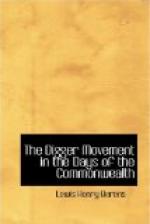“A LETTER TO LORD FAIRFAX AND HIS COUNCIL OF WAR:[100:1]
With divers questions to the Lawyers
and Ministers: Proving it an
undeniable equity that the Common People
ought to dig, plow,
plant and dwell upon the Commons without
hiring them or paying
Rent to any.
Delivered to the General and his
Chief Officers, June 9th, 1649, by
Gerrard Winstanley in the behalf of those
who have begun to dig
upon George Hill in Surrey.”
The letter opens as follows:
“Our digging and ploughing upon George Hill in Surrey is not unknown to you, since you have seen some of our persons, and heard us speak in defence thereof; and we did receive kindness and moderation from you and your Council of War, both when some of us were at Whitehall before you, and when you came in person to George Hill to view our works. We endeavour to lay open the bottom and intent of our business as much as can be, that none may be troubled with doubtful imaginations about us, but may be satisfied in the sincerity and universal righteousness of the work.”
It then continues:
“We understand that our digging upon that Common is the talk of the whole Land, some approving, some disowning; some are friends filled with love, and see that the work intends good to the Nation, the peace whereof is that which we seek after; others are enemies filled with fury, who falsely report of us that we have intent to fortify ourselves, and afterwards to fight against others and take away their goods from them, which is a thing we abhor. And many other slanders we rejoice over, because we know ourselves clear, our endeavour being no otherwise but to improve the Commons, and to call off that oppression and outward bondage which the Creation groans under, as much as in us lies, and to lift up and preserve the purity thereof.”
Winstanley then declares that their opponents were but “one or two covetous freeholders that would have all the Commons to themselves, and that would uphold the Norman tyranny,” and still further explains his position, as follows:
“We told you, upon a question you put to us, that we were not against any that would have Magistrates and Laws to govern, as the Nations of the World are governed, but that, for our own parts, we shall need neither the one nor the other in that nature of government. For as our land is common, so our cattle is to be common, and our corn and fruits of the earth common, and are not to be bought and sold among us, but to remain a standing portion of livelihood to us and our children, without that cheating entanglement of buying and selling; and we shall not arrest one another. And then what need have we of imprisoning, whipping or hanging laws to bring one another into bondage? And we know that none of those that are subject to this righteous law dares arrest or enslave his brother for or about the objects of the Earth, because the Earth is made by our




